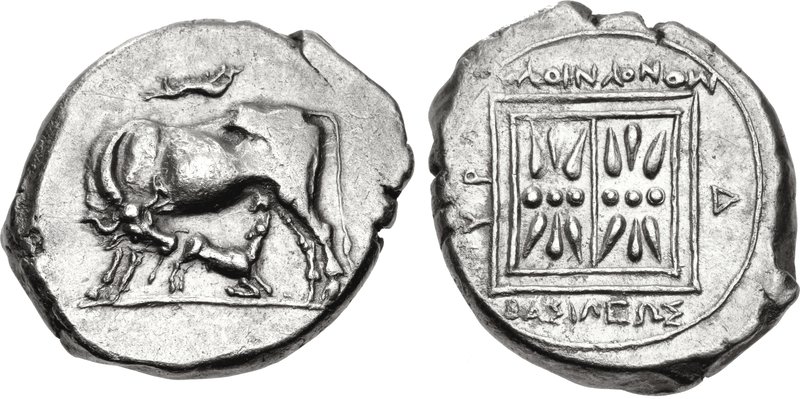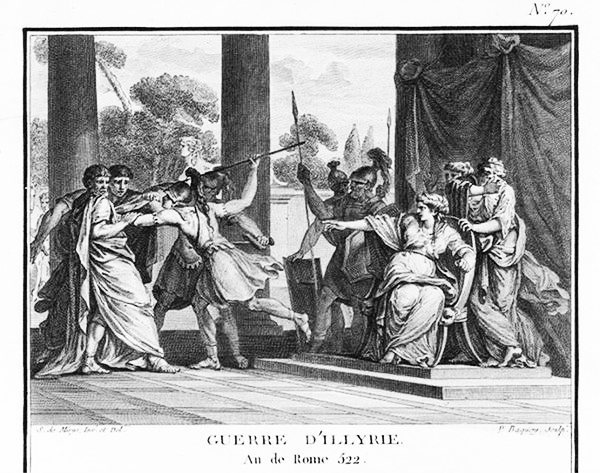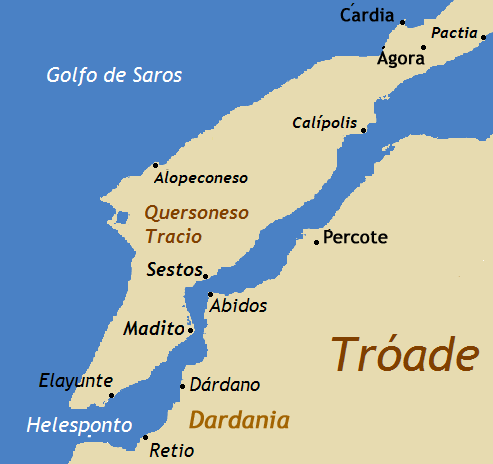|
Pleuratus III
Pleuratus III (Ancient Greek: Πλευρᾶτος; ruled c. 205 – 181 BC) was a ruler of the Illyrian kingdom under the Labeatan dynasty. He was the son of Scerdilaidas. Pleuratus continued his father's pro-Roman policy even more decidedly, so much that his loyalty to Rome was well known, even to other dynasts. He managed to extend the boundaries of the Illyrian State in the south when he was rewarded land annexed by Philip V of Macedon. He became one of the most prominent Illyrian kings of the time all because of his loyalty to the Romans. Pleuratus was succeeded by his son Gentius, who was the last Illyrian king. Military activities Pleuratus is listed among the parties to the Treaty of Phoenice in 205 BC. There is evidence that Pleuratus may have reigned with his father as co-regents prior to 205 BC. He may have been preparing for his future as sole king of the Ardiaean State. By 200 BC Pleuratus was ruling alone when he appeared at the Roman headquarters in Dassaretia ... [...More Info...] [...Related Items...] OR: [Wikipedia] [Google] [Baidu] |
Ancient Greek
Ancient Greek (, ; ) includes the forms of the Greek language used in ancient Greece and the classical antiquity, ancient world from around 1500 BC to 300 BC. It is often roughly divided into the following periods: Mycenaean Greek (), Greek Dark Ages, Dark Ages (), the Archaic Greece, Archaic or Homeric Greek, Homeric period (), and the Classical Greece, Classical period (). Ancient Greek was the language of Homer and of fifth-century Athens, fifth-century Athenian historians, playwrights, and Ancient Greek philosophy, philosophers. It has contributed many words to English vocabulary and has been a standard subject of study in educational institutions of the Western world since the Renaissance. This article primarily contains information about the Homeric Greek, Epic and Classical periods of the language, which are the best-attested periods and considered most typical of Ancient Greek. From the Hellenistic period (), Ancient Greek was followed by Koine Greek, which is regar ... [...More Info...] [...Related Items...] OR: [Wikipedia] [Google] [Baidu] |
Paionia (municipality)
Paionia (, ) is a municipality in the Kilkis regional unit of Central Macedonia, Greece. The seat of the municipality is the town Polykastro. The municipality is named after the ancient region of Paeonia. It has an area of 919.276 km2. Municipality The municipality Paionia was formed at the 2011 local government reform by the merger of the following 5 former municipalities, that became municipal units: * Axioupoli * Evropos * Goumenissa * Livadia *Polykastro Province The province of Paionia () was one of the provinces of the Kilkis Prefecture. Its territory corresponded with that of the current municipality Paionia, except the municipal unit Polykastro Polykastro (, before 1928 , ''Karasoúli''; ''Pandektis: Name Changes of Settlements in Greece'', compiled by the/ref>) is a town and a former municipality in Kilkis (regional unit), Kilkis regional unit of Central Macedonia, Greece. Since the 20 .... It was abolished in 2006. References Municipalities of Cen ... [...More Info...] [...Related Items...] OR: [Wikipedia] [Google] [Baidu] |
3rd-century BC Monarchs In Europe
The 3rd century was the period from AD 201 (represented by the Roman numerals CCI) to AD 300 (CCC) in accordance with the Julian calendar. In this century, the Roman Empire saw a crisis, starting with the assassination of the Roman Emperor Severus Alexander in 235, plunging the empire into a period of economic troubles, barbarian incursions, political upheavals, civil wars, and the split of the Roman Empire through the Gallic Empire in the west and the Palmyrene Empire in the east, which all together threatened to destroy the Roman Empire in its entirety, but the reconquests of the seceded territories by Emperor Aurelian and the stabilization period under Emperor Diocletian due to the administrative strengthening of the empire caused an end to the crisis by 284. This crisis would also mark the beginning of Late Antiquity. While in North Africa, Roman rule continued with growing Christian influence, particularly in the region of Carthage. In Persia, the Parthian Empire was s ... [...More Info...] [...Related Items...] OR: [Wikipedia] [Google] [Baidu] |
Illyrian Kings
The Illyrians (; ) were a conglomeration of Indo-European peoples and tribes in the Balkan Peninsula, Southeastern Europe. They spoke the Illyrian language and practiced a multitude of common religious and cultural practices. Many Illyrian groups formed a distinct tribal mode of social organisation, which survived much later in the form of the Albanian tribal system. In late Iron Age and early classical antiquity, the first polities of the area would be created by tribal groupings, including the Taulantii and Dardani. The most powerful Illyrian states of the area, the Ardiaean kingdom, emerged in the 3rd century BC during the rule of Agron and Teuta. The Illyrians came into conflict with Roman Republic and were defeated in the Illyrian Wars, which were followed by many revolts. The largest and last of them was the Great Illyrian Revolt (6-9 BC). The beginning of the integration of the region of Illyria in the Roman world followed the revolt and saw many Illyrians rise thro ... [...More Info...] [...Related Items...] OR: [Wikipedia] [Google] [Baidu] |
Illyrian Warfare
The history of the Illyrians spans from the beginning of the 2nd millennium BC up to the 1st century AD in the region of Illyria and in southern Italy where the Iapygian civilization flourished. It concerns the armed conflicts of the Illyrian tribes and Illyrian kingdoms, their kingdoms in the Balkans in Italian peninsula, Italy as well as pirate activity in Mediterranean Sea, Mediterranean. Apart from conflicts between Illyrians and neighbouring nations and tribes, numerous wars were recorded among Illyrian tribes themselves. Illyrians were renowned warriors, according to ancient sources. They were known as skilled craftsmen and shipbuilders in ancient times and controlled much of the Adriatic and Ionian Sea using their numerous warships. Illyrians had effective weapons such as the sica, a curved-tip sword that originated in Illyria and was eventually adopted all over the Balkans and used later by the Ancient Rome, Romans. Mythological Instances of Illyrians engaged in armed con ... [...More Info...] [...Related Items...] OR: [Wikipedia] [Google] [Baidu] |
Caravantius
Caravantius, an Illyrian, was half brother to Gentius, the last Illyria In classical and late antiquity, Illyria (; , ''Illyría'' or , ''Illyrís''; , ''Illyricum'') was a region in the western part of the Balkan Peninsula inhabited by numerous tribes of people collectively known as the Illyrians. The Ancient Gree ...n king of the Ardiaean State. In 168 BC he foughtThe Illyrians by J. J. Wilkes, 1992, , page 174, "... Illyrian navy sent to attack supply-routes, and the story resumes with Gentius trapped in Scodra and hoping for relief from Caravantius. ..." with his brother against the Cavii. References Bibliography *''The Illyrians'' by J. J. Wilkes, 1992 Illyrian people {{europe-royal-stub ... [...More Info...] [...Related Items...] OR: [Wikipedia] [Google] [Baidu] |
Third Illyrian War
The Illyrian Wars were a series of wars fought between the Roman Republic and the Illyrian kingdom under the Ardiaei and Labeatae. In the ''First Illyrian War'', which lasted from 229 BC to 228 BC, Rome's concern was that the trade across the Adriatic Sea increased after the First Punic War at a time when Ardiaei power increased under queen Teuta. Attacks on trading vessels of Rome's Italic allies by Illyrian pirates and the death of a Roman envoy named Coruncanius on Teuta's orders,Zock, 99. prompted the Roman senate to dispatch a Roman army under the command of the consuls Lucius Postumius Albinus and Gnaeus Fulvius Centumalus. Rome expelled Illyrian garrisons from a number of Greek cities including Epidamnus, Apollonia, Corcyra, Pharos and established a protectorate over these Greek towns. The Romans also set up Demetrius of Pharos as a power in Illyria to counterbalance the power of Teuta.Eckstein, 46–59. The ''Second Illyrian War'' lasted from 220 BC to 219 BC. In 219 ... [...More Info...] [...Related Items...] OR: [Wikipedia] [Google] [Baidu] |
Dalmatae
The Dalmatae, alternatively Delmatae, during the Roman period, were a group of Illyrian tribes in Dalmatia, contemporary southern Croatia and western Bosnia and Herzegovina. The region of Dalmatia takes its name from the tribe. The Delmatae appear in historical record for the first time in 181 BC, when upon the death of their ruler Pleuratus III of the Illyrian kingdom, they refused to accept the rule of his son, Gentius and seceded. They expanded and came to include coastal Illyrian tribes like the Tariotes, the Hylli and the Nesti and increased their territory to the north against the Liburni. Conflict with Roman expansionism and its local allies in the eastern Adriatic began in 156–55 BC. The Roman–Dalmatae Wars lasted until 33 BC when Octavian (the later Emperor Augustus) installed Roman hegemony in Dalmatia. Local instability and minor rebellions continued in the province of Dalmatia and culminated in the Great Illyrian Revolt in Dalmatia and closely linked Pann ... [...More Info...] [...Related Items...] OR: [Wikipedia] [Google] [Baidu] |
Polybius
Polybius (; , ; ) was a Greek historian of the middle Hellenistic period. He is noted for his work , a universal history documenting the rise of Rome in the Mediterranean in the third and second centuries BC. It covered the period of 264–146 BC, recording in detail events in Italy, Iberia, Greece, Macedonia, Syria, Egypt and Africa, and documented the Punic Wars and Macedonian Wars among many others. Polybius' ''Histories'' is important not only for being the only Hellenistic historical work to survive in any substantial form, but also for its analysis of constitutional change and the mixed constitution. Polybius' discussion of the separation of powers in government, of checks and balances to limit power, and his introduction of "the people", all influenced Montesquieu's '' The Spirit of the Laws'', John Locke's '' Two Treatises of Government'', and the framers of the United States Constitution. The leading expert on Polybius for nearly a century was F. W. Walbank (1909 ... [...More Info...] [...Related Items...] OR: [Wikipedia] [Google] [Baidu] |
Illyria
In classical and late antiquity, Illyria (; , ''Illyría'' or , ''Illyrís''; , ''Illyricum'') was a region in the western part of the Balkan Peninsula inhabited by numerous tribes of people collectively known as the Illyrians. The Ancient Greeks initially used the term Illyris to define approximately the area of northern and central Albania down to the Aoös valley (modern Vjosa) and the Bay of Vlorë, including in most periods much of the lakeland area ( Ohrid and Prespa). It corresponded to the region that neighboured Macedonia and Epirus. In Roman times the terms Illyria, Illyris, or Illyricum were extended from the territory that was roughly located in the area of the south-eastern Adriatic coast (modern Albania and Montenegro) and its hinterland, to a broader region stretching between the whole eastern Adriatic and the Danube. From about mid-1st century BC the term '' Illyricum'' was used by the Romans for the province of the Empire that stretched along the eastern A ... [...More Info...] [...Related Items...] OR: [Wikipedia] [Google] [Baidu] |
Eumenes
Eumenes (; ; ) was a Ancient Greece, Greek general, satrap, and Diadoch, Successor of Alexander the Great. He participated in the Wars of Alexander the Great, serving as Alexander's personal secretary and later on as a battlefield commander. Eumenes depicted himself as a lifelong loyalist of Alexander's dynasty and championed the cause of the Macedonian Argead dynasty, Argead royal house. In the Wars of the Diadochi after Alexander's death, Eumenes initially supported the regent Perdiccas in the First War of the Diadochi, First Diadochi War, and later the Argead royalty in the Second War of the Diadochi, Second Diadochi War. Despite less experience as a commander, Eumenes defeated Craterus, one of Alexander's most accomplished generals, at the Battle of the Hellespont (321 BC), Battle of the Hellespont in 321 BC. After Perdiccas' murder in 320 BC Eumenes became a public enemy of the new Partition of Triparadisus, Post-Alexander regime under Antipater and Antigonus I Mono ... [...More Info...] [...Related Items...] OR: [Wikipedia] [Google] [Baidu] |





